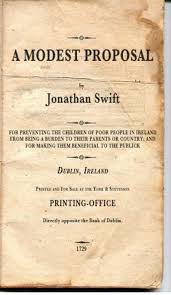My next book project is a memoir about the teaching life. I started gathering materials for it two summers ago–thanks to 18 months of pandemic, I’m just returning to it now. I’m going to be occasionally trying things out here on the blog over the summer as I sort through three decades worth of material–probably every Thursday. I begin with one of the most effective and thought-provoking hoaxes I ever pulled on my students . . .
 In 1729, Jonathan Swift of Gulliver’s Travels fame anonymously published a short work entitled A Modest Proposal, one of the great works of satire in the Western literary tradition. The complete title of Swift’s essay is A Modest Proposal for Preventing the Children of Poor People From Being a Burthen to Their Parents or Country, and for Making Them Beneficial to the Publick. In this extended essay, Swift in apparent seriousness proposes that the impoverished Irish might ease their economic troubles by selling their children as food for rich gentlemen and ladies. He goes to great lengths to support his argument, including a list of possible culinary preparation styles for the children, and calculations showing the financial benefits of his suggestion, all in a matter-of-fact style that can easily convince the reader, for a while at least, that he is perfectly serious. It takes some time for the unsuspecting reader to realize that Swift’s essay is a clever and devastating satire and commentary on the abuse of Irish peasants by their English landlords.
In 1729, Jonathan Swift of Gulliver’s Travels fame anonymously published a short work entitled A Modest Proposal, one of the great works of satire in the Western literary tradition. The complete title of Swift’s essay is A Modest Proposal for Preventing the Children of Poor People From Being a Burthen to Their Parents or Country, and for Making Them Beneficial to the Publick. In this extended essay, Swift in apparent seriousness proposes that the impoverished Irish might ease their economic troubles by selling their children as food for rich gentlemen and ladies. He goes to great lengths to support his argument, including a list of possible culinary preparation styles for the children, and calculations showing the financial benefits of his suggestion, all in a matter-of-fact style that can easily convince the reader, for a while at least, that he is perfectly serious. It takes some time for the unsuspecting reader to realize that Swift’s essay is a clever and devastating satire and commentary on the abuse of Irish peasants by their English landlords.
I love satire and frequently use it in class to great effect, an effect heightened by the fact that the average college undergraduate can’t tell the difference between satire, irony, and a spreadsheet. A few semesters ago, I team-taught a colloquium called Markets and Morals—one of our texts for lecture and seminar was Michael Sandel’s What Money Can’t Buy, a fascinating investigation of how in our contemporary world market economies are inexorably turning into market societies. A market society is one in which values, ideas and practices that have traditionally been outside the realm of the dollar sign and commodification have begun to be treated as just another thing to be bought and sold. From marriage arrangements to human life, everything has become a commodity for sale.
Tucked within tons of real-life case studies, Sandel provides some useful tools for identifying “market creep.” Trust your intuitions, he says—if your gut tells you, for instance, that there is something wrong with employers like Walmart buying life insurance policies on their unsuspecting employees then cashing in big when the employees die, or if you think there’s something morally amiss with high-powered special interest groups such as big oil hiring people to stand for hours in line to secure coveted seats in congressional or Supreme Court hearings (and thus doing an end run on the democratic, “first come, first served” process), chances are that there is either a problem of fairness or a problem of corruption in play. Either something that has traditionally been thought of in egalitarian terms has suddenly become for sale to the highest bidder (fairness problem), or a value that we cherish is being eroded and cheapened as it gets sucked into the market vortex (corruption problem).
Rather than use Sandel’s own examples (the majority of which you can watch him discuss with various audiences on YouTube—the guy’s a rock star phenomenon in the world of academia), I decided to develop my own case study situated directly within the context I share with my students twice per week: classroom and course dynamics. I introduced my “modest proposal” as follows:
It has been my practice for many years when assigning students a paper in a class to offer my time and expertise for reviewing up to two pages worth of double-spaced rough draft material up to five days before the paper is due. I will read and comment on the rough draft material and send it back within 24 hours of receiving it. My experience is that students who avail themselves of my rough-draft commenting services earn on the average a grade that is five points higher than those who do not.
Since in any given semester I have anywhere from 60 to 75 students for whom I am the sole grader, and there are times (such as around midterm) when a written assignment is due in all of my classes, it is often difficult to keep up with the rough draft demands, particularly when many students send their rough draft material to me just before the deadline. I always read this material on a “first come, first served” basis; it is undoubtedly the case that I am not able to pay as much attention to each student’s rough draft material as I would like because of the pressure to return the material with comments in time for it to be helpful in writing the final draft.  Those students who are unable or unwilling to start their papers early are at a disadvantage in terms of getting my full attention and expertise when I am swamped close to the deadline.
Those students who are unable or unwilling to start their papers early are at a disadvantage in terms of getting my full attention and expertise when I am swamped close to the deadline.
A similar problem arises during my scheduled office hours during the days leading up to the due date for a major assignment or exam. A line of a dozen or more students is a frequent occurrence outside my door. Often I am not able to see everyone because my office hours end and I have to go to class or a meeting; often students who have waited for a long time have to leave before seeing me because of a class or another appointment (or because they get sick of waiting). So I wish to make a modest proposal for your consideration:
QUEUE THE POWERPOINT PRESENTATION
At the beginning of each semester, my students will have the opportunity to purchase a Morgan Preferred-Access Pass for $250, a purchase that will provide a student with the following semester-long benefits:
- Your rough-draft material will be read, commented on, and returned within six hours of receipt (unless it was submitted between midnight and 6:00 AM), even when there are several rough draft submissions ahead of yours that have not yet been read. Your Preferred-Access Pass, in other words, entitles you to the privilege of jumping to the front of the e-line.
- Your Preferred-Access Pass also entitles you to jump to the head of the line outside my door during office hours for one-on-one conversation with me.
- Your Preferred-Access Pass is transferable. For instance, if you believe that you are in good shape on a particular assignment and do not need my help or expertise, you may rent your Preferred-Access Pass to a fellow student lacking such a pass to use for that assignment only.
- Please Note: Your Pass gains you preferred access to me by jumping the queue—it does not guarantee any particular grade on any given assignment.
I have said on occasion over the years that teaching is often like acting—a convincing performance is everything. On this particular morning, I was good; the students were unaware that a good deal of the “data” I used in the setup for my proposal was made up on the fly. For instance, I have no hard evidence that students who avail themselves of my rough-draft-reading services earn five points higher in their final grade than those who don’t. That’s an educated guess, primarily based on my observation over the years that the students who do send me rough draft material are the A-/B+ students who probably are the only ones in class who don’t need my input and suggestions. Furthermore, I don’t know if I have ever had more than two students waiting outside my door during office hours, even when a paper is due. In my proposal I am channeling people like my colleague across the hall in the philosophy department who often has more than a dozen students sitting on the floor waiting to see him. I would say I’m envious, but I’m not—I’m an introvert.
But I sold my modest proposal to my students with sincerity and a straight face, then asked them to discuss my proposal in small groups for ten minutes, both constructing an argument in favor and imagining what a critic might say. When we got back together, the conversation soon revealed that they had taken me seriously, and they were not amused. My proposal didn’t strike them as being quite as problematic as selling one’s children to rich people as snack food, but close. Stay tuned next week for A Modest Proposal—Part Two; or why my time should not be for sale. Until then, what do you think of my modest proposal?












